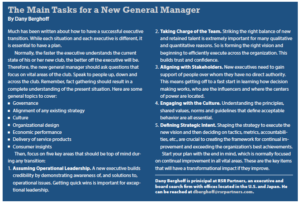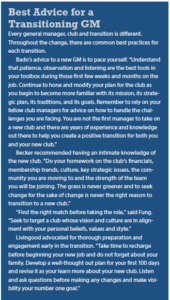The private club industry is a vibrant and ever changing community. Members, staff and general managers have often called multiple clubs “home” throughout their club lives, making private clubs one of the most supportive and inclusive segments of the hospitality industry.
In particular, general managers (GM) have a difficult task when moving throughout the industry. They became experts at their current club, however, during a transition, they take their experiences to a new space—forging new relationships and methodologies, learning the new club and its culture, all while maintaining their unique identity as a club executive.
This article gathers the perspectives of prominent club executives who have made recent successful transitions to new club homes. Those interviewed were:
Mark Bado, MCM, CCE, who transitioned to general manager at Myers Park Country Club in Charlotte, N.C. from The Kansas City Country Club in Mission Hills, Kan. He has also served as the GM/COO at Country Club of Peoria in Peoria, Ill., and Wildwood Golf Club in Allison Park, Pa.
Chad Becker, CCM, who transitioned to GM/CEO at The Mountain Air Club in Burnsville, N.C., from 3 Creek Ranch Golf Club in Jackson, Wyo. He also served as the GM/COO at the Golf Club of Avon in Avon, Conn., and the Columbian Country Club of Dallas in Carrollton, Texas.
Fred Fung, who transitioned to GM/COO at Charlotte Country Club in Charlotte, N.C., from the assistant general manager role at Bonita Bay Club in Naples, Fla. He also served as club manager at Fisher Island Club in Fisher Island, Fla., and the director of club operations at Turnberry Isle Miami in Aventura, Fla.
Joel Livingood, who transitioned to GM/COO at Interlachen Country Club in Edina, Minn., from North Oaks Golf Club in North Oaks, Minn. He also served as the GM/COO at Oxbow Country Club in Fargo, N.D.
Preparation
Before stepping foot into a club as its new general manager, club executives should learn as much as they can about their new workplace. “The more information a new manager has on day one, the better prepared for success they will be,” said Joel Livingood.
Working with club staff and the board can provide key information to help the new GM start their job on the right foot. Mark Bado suggested information can be collected by the administrative assistant for the new GM to study, including minutes from past and current board and committee meetings, past newsletters, the club’s mission statement, strategic and capital plans, membership directory and staff directory. He also pointed out that it is critical to understand areas of concern and success from the club’s history.
Other information such as a five-year analysis of financial and membership data, key performance indicators, membership demographics and membership trends can be found with the board, controller and membership director, noted Chad Becker. He added that a new general manager should communicate office needs and setup to staff prior to day one.
Fred Fung recommended knowing the club’s organizational structure and culture prior to day one. The search firm will facilitate acquiring this information and candidates should thoroughly review this information.
In addition to these items, Livingood also pointed out the significance of taking time in between roles to reflect and analyze professional successes and areas for improvement.
Day One
Day one is an opportunity for the GM to meet the club staff, board directors and members.
“Meeting with staff will help to alleviate any fears they might have,” said Fung. All of the GMs interviewed for this article identified meeting key club staff as a top priority. Livingood provided his resume to his staff and created a presentation to introduce himself on a more personal level.
In addition, the new GM should tour the club facilities and meet as many people (staff and members) as possible. It is also a time to learn the day-to-day basics: setting up the office (email, phone, etc.), learning which rooms members use, where to eat, upcoming events, etc.
 The First 100 Days
The First 100 Days
While a lot changes for the new GM during the first few months of their tenure, the club should refrain from dramatic change, according to the GMs. New managers should focus on learning about the club, identifying its culture and forging strong relationships.
“Observe and take notes,” said Becker.
Bado added, “This is a period of listening, observation and note-taking to be used later. Purposefully absent from the 100-day plan is any notion of implementing sweeping change or updates.”
The first few weeks allows the GM to schedule meetings, tours, meet-and-greets and daily debriefs with key team members and the club president. The new GM should begin to prioritize urgent, short- and long-term tasks, and identify easy fixes at the new club, said Becker.
“Visibility is key during this period,” said Becker. He suggested establishing open channels of communication as well as regularly scheduled meetings.
To help this process, the transitioning GM should grow relationships with their new team that are founded on trust. The relationship with the club president is most critical. Regular meetings with the club president to discuss goals, expectations (from the board and the GM) and to develop an understanding of management style will help the transition go more smoothly. At Interlachen Country Club, Livingood had the opportunity to meet with the 12 previous club presidents, which offered valuable information about the club from the perspectives of members whose knowledge spanned multiple generations at the club.
Listen to Create Buy-in
GMs need to build relationships and trust to have a successful transition. Listening is one of the best ways to accomplish this. “You listen to them, get to know them and let them get to know you,” said Bado regarding the club board and staff.
“Be careful what you say, listen more than you speak, do what you said you were going to do, and do not compromise on your morals or standards,” said Becker.
“We are in the relationship business,” said Fung. “Every interaction the new GM has either adds or takes away from their ability to build trust. Being visible and following-through on your commitments is especially important during this period.”
Livingood pointed out the difficulty in making decisions without listening first. “Extend trust in the new team from the onset. Create understanding, be transparent and define expectations,” said Livingood. “People support what they help create so I strive to include team members in the decision-making process.”
Building trust also creates buy-in from staff and the board—key segments of the club. According to Bado, depending on the club, this time to earn trust can be short or long. “You must also develop a great working relationship with the current club president, meeting frequently to confer regarding goals, expectations (both from the board and from the new GM) and to develop an understanding of what your management style and game plan will be for adjusting to this new club,” said Bado.
Some clubs and their boards will want quick changes while others want a gradual shift. Regardless, buy-in is generated from respect. Consider the club’s interests first rather than your own. “Introduce rather than advocate for your new ideas,” said Fung.
“Present issues and solutions in a way not to throw others under the bus, but in a way to recognize their efforts and challenges they faced,” Becker added. Be diplomatic, use facts to communicate your agenda.” Industry benchmarks can provide much-needed education to staff and the board as well as remove doubt of the GMs intentions for their agenda.
“When considering the ideas of others, show professional interest in their ideas if you expect them to buy into your own ideas,” said Bado.
 Transitioning to a New Club Culture
Transitioning to a New Club Culture
Every club is unique, each with its own set of rules, members, staff, customs and personality. This can create difficulties in searching for the right fit for both the club and the new GM. The new club’s existing culture can be one of the most difficult barriers to good performance. “It must be understood before it can be changed, which is a delicate process,” said Livingood.
“Ideally, a new GM does not need to adjust to a new club culture because it is already a good cultural fit,” said Fung.
However, when there are differences, the GM should continue to listen and learn from members, the board and staff. Tenured staff can be very useful. Through conversations, asking questions and spending time with these individuals, the GM can learn expectations and start to shape the club’s culture.
Challenges
With any transition comes a new set of challenges for both the GM and the club. This often means assessing the different point of views for how to improve the club. Bado said that his new club was committee-driven, but lacked proper leadership structure. Bado’s solution focused on creating a governance model as well as capital and strategic plans to use as the new starting point for future decision making. By enlisting supportive board members to act as a sounding boards and advocates, progress has been made.
Other challenges are tied to staff and members adverse to change, noted Becker. “The solution is to continue to be visible and to listen and learn from the club and its members, building trust through incremental changes over time.”
The new budget can be another point of friction between a new GM and the club. Use industry trends to support changes in the new budget. Compare it to previous budgets and address assumptions the club makes.
The GM should also pace the board’s decision making during the transition. The board should allow the GM time to learn the issues and gather ample information before making significant changes.
Unity
Lack of teamwork can hinder clubs going through a transition. Both Bado and Becker dealt with this at their new clubs.
For Bado, an autonomous staff meant there was less teamwork than required for a successful club environment. He worked hard to earn staff trust by conducting multiple discussions with small groups and individuals regarding personal and professional goals, analyzing club strengths and weaknesses, and how staff contributed to and received value from the club. All-staff meetings were held to develop a staff mission statement that mirrored the club’s statement and strategic plan. With time, the staff is working more closely together.
Becker found that segments of the membership were dissatisfied with the club and that the club culture lacked professionalism and unified vision. He emphasized working closely with the board to identify urgent issues and generate support for unaddressed issues with members and staff. Like Bado, Becker began meeting with individuals to review concerns and solutions.
Most Difficult Challenge
A new GM has a slew of challenges, the hardest of which varies for each new club head. Bado said that keeping perspective, not overworking and pacing himself has been the most difficult challenge.
Becker mentioned the unknown issues and agendas that quickly arise with a damaged club culture.
Livingood commented on the lack of institutional knowledge of the club and its membership. He remedies this by heavily relying on longstanding staff and club members to help him better understand the club.
Adapting
An effective club executive adapts to a new situation without compromising their management style and principles. Learning about the board, staff and members and having an interest in their success will boost the GM’s ability to adapt to the new club, however, their leadership style should not change.
 What Would You Do Differently?
What Would You Do Differently?
The managers agreed that having more information about the club would improve their transitions. “No one has heard someone say they would have been better off with less planning,” said Livingood. Institutional knowledge is key to a transition whether gathering more information through face-to-face meetings or reviewing historical items. Becker mentioned that having the five-year trend analysis (as opposed to two to three year) would be helpful. Bado included that he would lean more heavily on his support team outside of the club to help deal with the rigors of a transition.
Taking adequate personal time between new positions is another issue club executives would do differently. (See the sidebar at right by Christine Pooler)
Board and Staff Role in Transition
Just as the new GM should exercise patience and openness, so should the board and staff. For all parties, change will not happen over night. “They need to remember why they hired their new GM in the first place and allow him or her to use that skill and leadership style to create a management plan for the club and its future,” said Bado.
At the same time, Becker believes the board and staff should continue to operate as a unit and work in consensus, not allowing divisions. The board needs to raise concerns with the GM and promote transparency.
The board and staff also have key institutional knowledge. They should review the club’s history, including important decisions made and educate the GM on its history, including key decisions and outcomes, tours of the facilities and information on competitors. A calendar should be prepared and sent to the incoming GM with all club events, board meetings, committee meetings, staff meetings, annual meetings and other pertinent deadlines.
Skills to Succeed in a New Club Environment
Bado, Becker, Fung and Livingood identified several key skills necessary to a successful transition.
GMs should exhibit strong interpersonal skills. They should be patient, open-minded, and have a large capacity to listen and reflect. An effective GM should also be confident and engaged with the entire club, as well as have strong communication skills, being diplomatic with others and giving precise answers.
GMs should also have a thorough knowledge of their new club as well as the latest trends and benchmarking data impacting the private club industry.
Recipe for Success
The transition process for the club and its new GM can be difficult. It requires thorough planning, due diligence and patience. While much happens over the course of a GM’s tenure, the featured GMs agreed that the recipe for a successful transition comes from the manager’s and club’s preparation prior to them joining the club and the level of engagement during the GM’s first few weeks. Through these best practices, clubs and GMs should be able to enjoy a successful transition.


